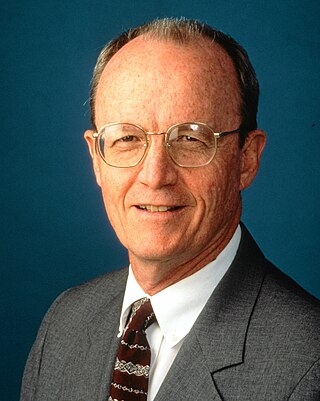
The MIT Lincoln Laboratory, located in Lexington, Massachusetts, is a United States Department of Defense federally funded research and development center chartered to apply advanced technology to problems of national security. Research and development activities focus on long-term technology development as well as rapid system prototyping and demonstration. Its core competencies are in sensors, integrated sensing, signal processing for information extraction, decision-making support, and communications. These efforts are aligned within ten mission areas. The laboratory also maintains several field sites around the world.

The College of Technology and Engineering (CTAE), is a public engineering college located in Udaipur, Rajasthan, India. It is one of the top ranking engineering institute of the state offering varied courses in engineering.

Robert C. Michelson is an American engineer and academic widely known for inventing the entomopter, a biologically inspired flapping-winged aerial robot, and for having established the International Aerial Robotics Competition. He has received degrees in electrical engineering from the Virginia Polytechnic Institute and the Georgia Institute of Technology. Michelson's professional career began at the U.S. Naval Research Laboratory where he worked on radar-based ocean surveillance systems. He later became a member of the research faculty at the Georgia Institute of Technology. At the Georgia Tech Research Institute (GTRI) he was involved in full-time research, directing over 30 major research programs.

The US National Center for Atmospheric Research is a US federally funded research and development center (FFRDC) managed by the nonprofit University Corporation for Atmospheric Research (UCAR) and funded by the National Science Foundation (NSF). NCAR has multiple facilities, including the I. M. Pei-designed Mesa Laboratory headquarters in Boulder, Colorado. Studies include meteorology, climate science, atmospheric chemistry, solar-terrestrial interactions, environmental and societal impacts.
The Georgia Tech Research Institute (GTRI) is the nonprofit applied research arm of the Georgia Institute of Technology in Atlanta, Georgia, United States. GTRI employs around 2,400 people, and is involved in approximately $600 million in research annually for more than 200 clients in industry and government.
The Health and Environmental Systems Laboratory (HESL) was one of eight labs in the Georgia Tech Research Institute. In mid-2006, it was disbanded, and the staff were transferred to other parts of GTRI. ELSYS, the largest lab within GTRI, received most of the personnel.
The Sensors and Electromagnetic Applications Laboratory is one of eight labs in the Georgia Tech Research Institute and one of three labs under the Sensors and Intelligent Systems directorate. SEAL researchers investigate radar systems, electromagnetic environmental effects, radar system performance modeling and simulations, and antenna technology.
The Advanced Concepts Laboratory (ACL), formerly the Signature Technology Laboratory, is one of eight labs in the Georgia Tech Research Institute and one of three labs under the Sensors and Intelligent Systems directorate. ACL conducts research and development in four technical areas: electromagnetic materials and structures, electromagnetic apertures and scattering, optical and infrared physics and phenomenology, and secure information systems.

The College of Computing is a college of the Georgia Institute of Technology, a public research university in Atlanta, Georgia. It is divided into four schools: the School of Computer Science, the School of Interactive Computing, the School of Computational Science & Engineering, and the School of Cybersecurity and Privacy. The College of Computing's programs are consistently ranked among the top 10 computing programs in the nation. In 2022, U.S. News & World Report ranked the Computer Science graduate program #6 in the U.S. In 2016, Times Higher Education and the Wall Street Journal ranked the College #5 in the world.
The Advanced Learning and Research Institute (ALaRI), a faculty of informatics, was established in 1999 at the University of Lugano with the mission of promoting research and education in embedded systems. The Faculty of Informatics within very few years has become one of the Switzerland major destinations for teaching and research, ranking third after the two Federal Institutes of Technology, Zurich and Lausanne.
The Institute for Robotics and Intelligent Machines (IRIM@GT) is an interdisciplinary research unit at the Georgia Institute of Technology. The center was launched May, 2006, and consists of researchers from the School of Interactive Computing in the College of Computing, College of Engineering, and Georgia Tech Research Institute. IRIM@GT currently offers a Ph.D. program in robotics, the first truly multi-disciplinary program in the country after the one of Carnegie Mellon University.

Ronald Craig Arkin is an American roboticist and roboethicist, and a Regents' Professor in the School of Interactive Computing, College of Computing at the Georgia Institute of Technology. He is known for the motor schema technique in robot navigation and for his book Behavior-Based Robotics.
Korea Aerospace University is a private university located in Goyang, Gyeonggi, South Korea.

Stephen Edward Cross is the executive vice president for research (EVPR) at the Georgia Institute of Technology (Georgia Tech), a position to which he was appointed in 2010. As EVPR, Cross coordinates research efforts among Georgia Tech's colleges, research units and faculty; and provides central administration for all research, economic development and related support units at Georgia Tech. This includes direct oversight of Georgia Tech's interdisciplinary research institutes, the Georgia Tech Research Institute (GTRI), the Enterprise Innovation Institute (EI2) and the Georgia Tech Research Corporation (GTRC).
The Agricultural Technology Research Program (ATRP) is part of the Aerospace, Transportation and Advanced Systems Laboratory of the Georgia Tech Research Institute. It was founded in 1973 to work with Georgia agribusiness, especially the poultry industry, to develop new technologies and adapt existing ones for specialized industrial needs. The program's goal is to improve productivity, reduce costs, and enhance safety and health through technological innovations.

Edward K. Reedy was the director of the Georgia Tech Research Institute (GTRI) from 1998 to 2003, and correspondingly a vice president of the Georgia Institute of Technology. He first joined GTRI in 1970, and specialized in radar system development and electromagnetic scattering. Reedy held a variety of research and leadership positions within the organization, including the head of Research Operations and four years as associate director.
Rusty Roberts is the director of the Aerospace, Transportation and Advanced Systems Laboratory (ATAS) at the Georgia Tech Research Institute, a position he has held since April 2009.

William L. "Bill" Melvin is the deputy director of Sensors and Intelligent Systems at the Georgia Tech Research Institute. He is a former director of the GTRI Sensors and Electromagnetic Applications Laboratory (SEAL).
The service-oriented computing environment (SORCER) is a distributed computing platform implemented in Java. It allows writing network-programs that operate on wrapped applications (services) to spread across the network. SORCER is often utilized in scenarios similar to those where grids are used in order to run parallel tasks.
The Food Processing Technology Building is a Georgia Institute of Technology and Georgia Tech Research Institute facility. It houses the Food Processing Technology Division of GTRI, which includes the Agricultural Technology Research Program (ATRP) and Georgia’s Traditional Industries Program for Food Processing. It opened on March 1, 2005, and was dedicated on May 19, 2005.








